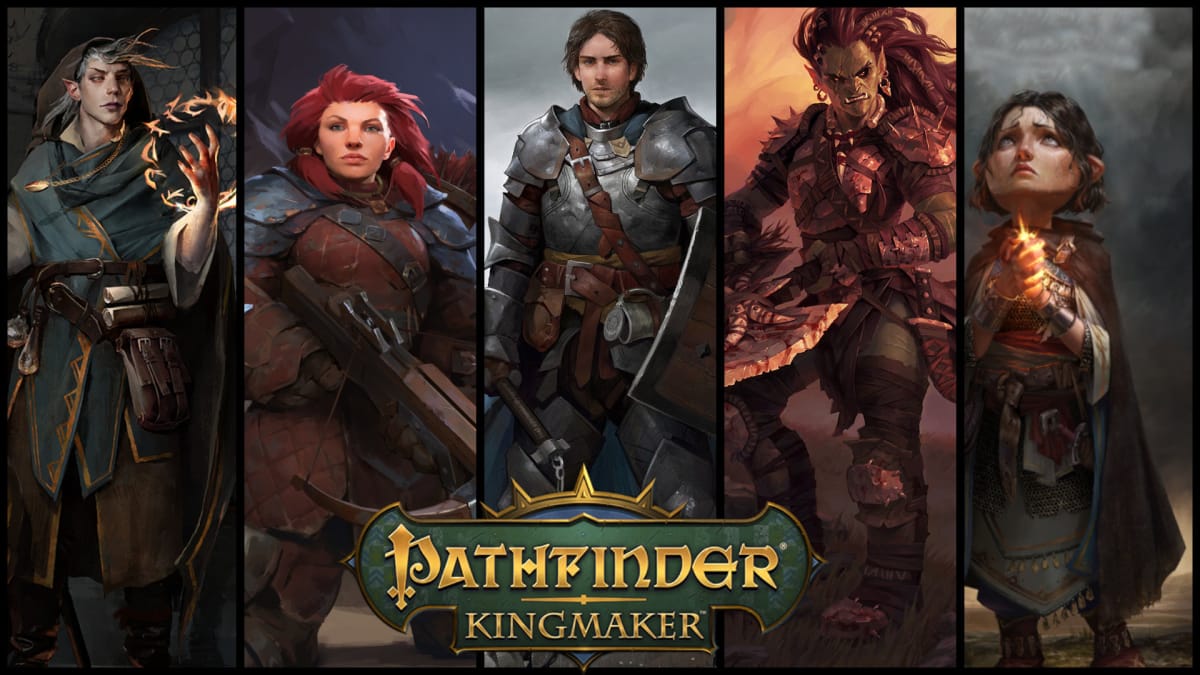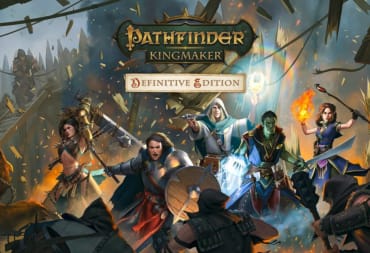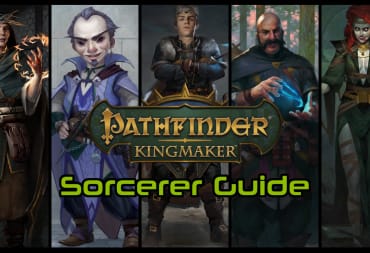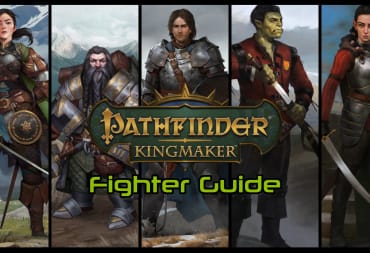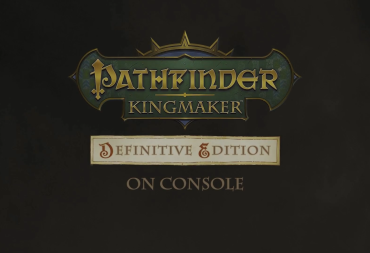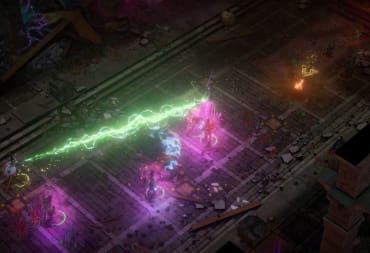The Definitive Edition of Pathfinder: Kingmaker is finally coming to consoles with an all new turn-based mode, and with that, it is a chance to introduce Pathfinder to a whole new audience. Kingmaker is a long, classic computer RPG that adapts the crunchiness—the complexity of the mechanics—of the tabletop quite well, but it also serves as a major barrier of entry for those looking to get into the title with relative ease.
Simply put, every aspect of Pathfinder: Kingmaker is an exercise of the player's knowledge of the game's mechanics, from dealing with random-rolled attacks to manipulating numbers based on resistances, saving throws, and abilities. Character creation is a hallmark of many great RPGs, and for Kingmaker this is taken to another level by being incredibly detailed. The Definitive Edition alone offers 16 different classes, nine races, and a multitude of options to fully customize your character.
With Kingmaker coming to consoles, perhaps it’s time to give a general explanation for character generation, so everyone can at least understand the intricate mechanics at play here. So this guide will do just that: walk through the basic character-creation process and provide some insight for players to help guide them through character creation.
Please note: This guide is intended for newer players who are curious about crunchy computer-role playing games, but have little to no experience with them. Pathfinder as a tabletop game is notoriously (and arguably needlessly) complex, and many guides over-rely on the jargon without ever explaining what most of that terminology means.
Pathfinder: Kingmaker - Rolling the Dice
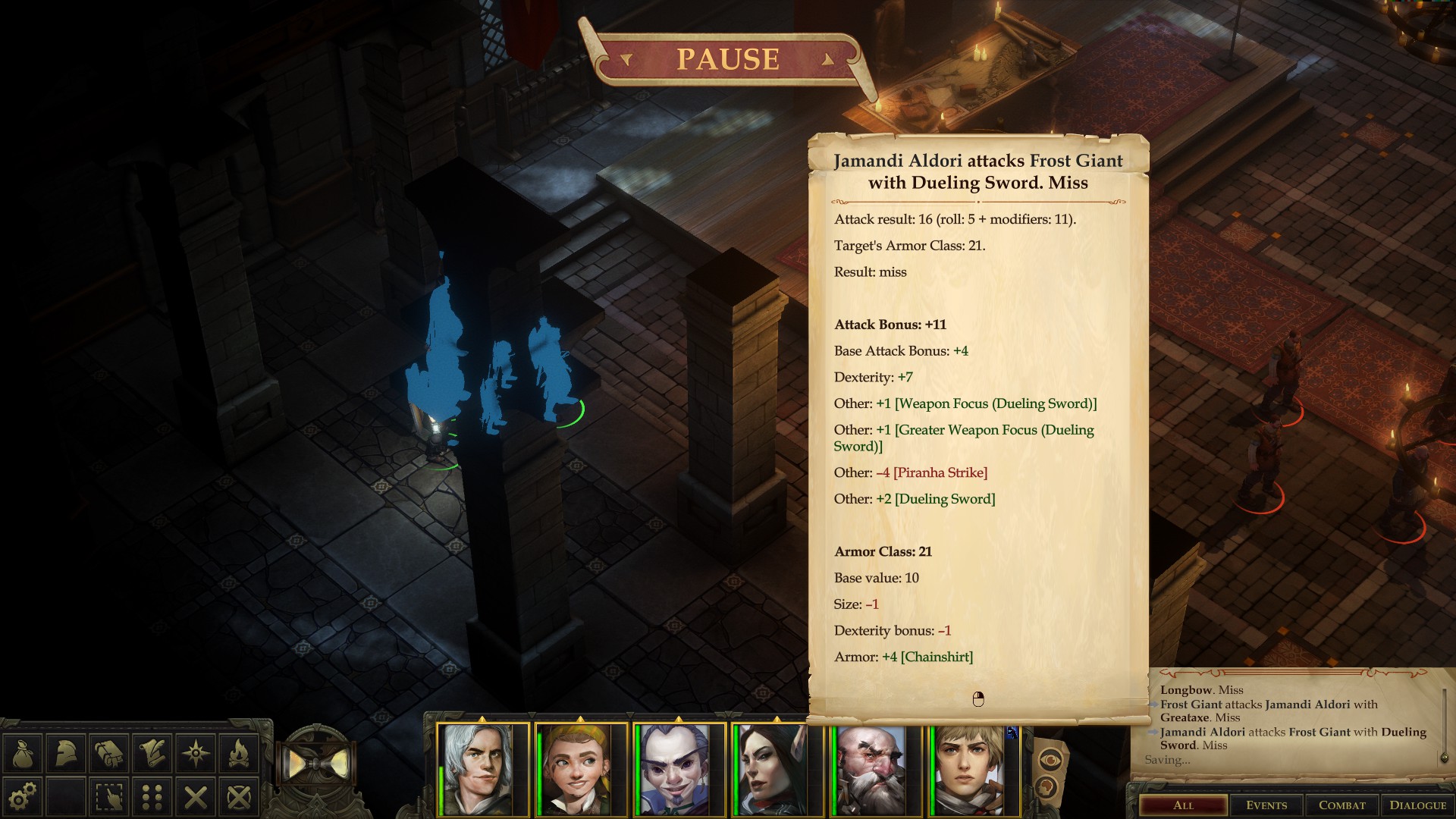
The first thing you need to know is that Pathfinder: Kingmaker is a game about dice rolls. Every attack, skill check, and even in some cases random encounters are all predicated on the game rolling a die in the background. The general rule of thumb is the higher your numbers, the better your chances at succeeding, so many players tend to maximize their odds by stacking characters with as many high numbers as possible.
This strategy is called ‘min-maxing’ and is a valid way to play Kingmaker, especially if you plan on playing on the harder difficulty levels where it is almost required. Because of the random nature of the dice rolls, Kingmaker is not an easy game even on easier difficulties. So the first thing to consider is the strengths and weaknesses of the type of character you wish to play.
Character generation is presented in the following order in Kingmaker: Portrait, Race, Class, Skills, Abilities, Feats/Spells, and Alignment.
Not all of these steps are really necessary to talk about much. Portrait and alignment, for example, are a personal selection for the type of character you want to role-play, and save for some dialogue choices within Kingmaker, don’t necessarily affect the game that much.The bulk of this guide then will focus on the other components, starting with attributes.
Pathfinder: Kingmaker - The Importance of Abilities
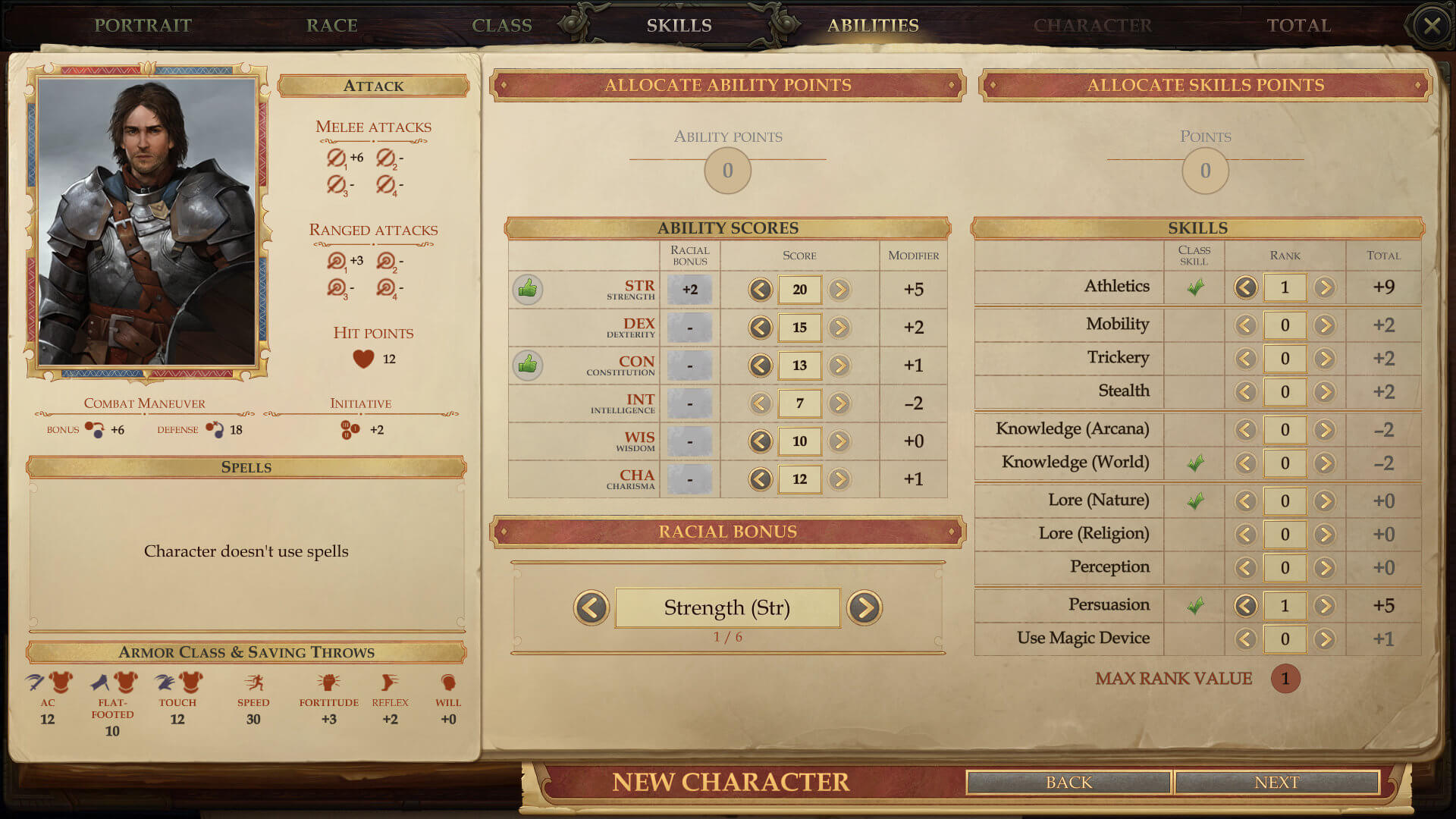
I know abilities come up later in character creation, but we need to mention it here now since it is the building blocks of any character building. There are a total of six abilities in Kingmaker, and anyone who is familiar with any RPG may recognize what these attributes are:
STR = Strength
DEX = Dexterity
CON = Constitution
INT = Intelligence
WIS = Wisdom
CHA = Charisma
Each ability also governs additional stats and skills. If you hover over the attribute in the character generation screen, it will highlight what it affects as well, giving you a visual representation of what high or low stats change on your character.
Strength governs your melee attack bonus, combat maneuverability offense, total carry weight, and your Athletics skill.
Dexterity governs your ranged attack bonus, combat maneuverability defense, initiative, reflex saves, Armor Class (AC), and the Mobility, Trickery, and Stealth skills.
Constitution governs your total hit points and fortitude saves.
Intelligence governs the number of skill points you gain each level, the amount of arcane spells you can cast, and the Knowledge: Arcana and Knowledge: World skills.
Wisdom governs the amount of divine spells you can cast, Will saves, and the Perception, Lore: Religion, and Lore: Nature skills.
Charisma governs the effectiveness of using magic devices, ability to influence others, bonuses to certain caster classes, and the Persuasion and Use Magic Device skills.
So why do you want high numbers? Players will get a total of 25 points to distribute to their stats, and every two levels of a stat, you will be rewarded with an increase in their stat modifier. A 16 in strength will yield a modifier of +3, for example, which gives you a raw modifier of +3 to attacking with melee weapons, increasing your chance of hitting creatures from a standard d20 to a d20+3.
That +3 may seem like a small bonus, but Kingmaker gives you a ton of options to stack your base attributes with other bonuses and modifiers. Starting with a +3 is actually pretty decent, and players interested in min-maxing their characters for maximum effect can get at least one ability all the way to 20 (giving you a +5 bonus) depending on their race and class choices.
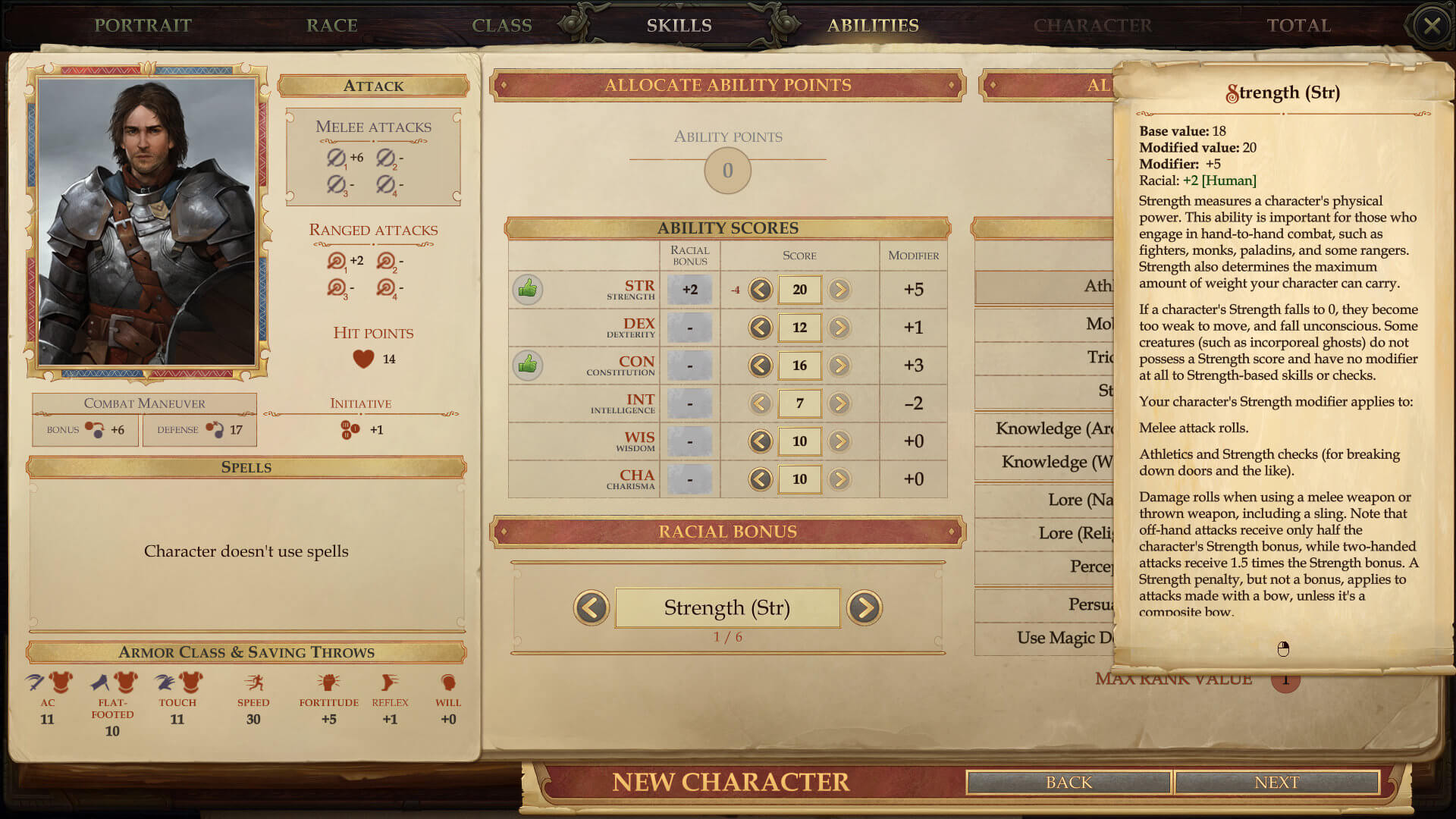
The downside is that this costs points, and the cost can be steep. For each additional modifier, it will cost you that amount of your attribute points. So that 16 strength will cost 10 attribute points, giving a player only 15 out of their 25 to use for their other stats.
The thresholds for these are all even numbers as well, at 12, 14, 16, 18, and 20 when the modifier increases. Note that you can typically only get a stat at the max of 18, unless you have an ability modifier based on your choice of race. This can increase your stat to a maximum of 20. The progression is as follows, showcasing the minimum modifier below, and the amount of points it costs to achieve that modifier.
10 = 0 (0 points)
12 = +1 (2 points)
14 = +2 (5 points)
16 = +3 (10 points)
18 = +4 (17 points)
20 = +5 (17 points plus an ability modifier)
Players can also choose to lower their abilities down to a minimum of 7 as well, giving you some extra points for ability modification. All of this, in the end, is the player's choice on how they want to build their character, but a typical strategy is to create a ‘dump stat’ for your character—a stat that your character would be weakest at—to get high ability modifiers in stats you need.
Remember, your character cannot do everything in a game like Kingmaker. They will have strengths and weaknesses, and you will need to rely on the party around you to shore up those weaknesses throughout the game.
Pathfinder: Kingmaker - Race Choices
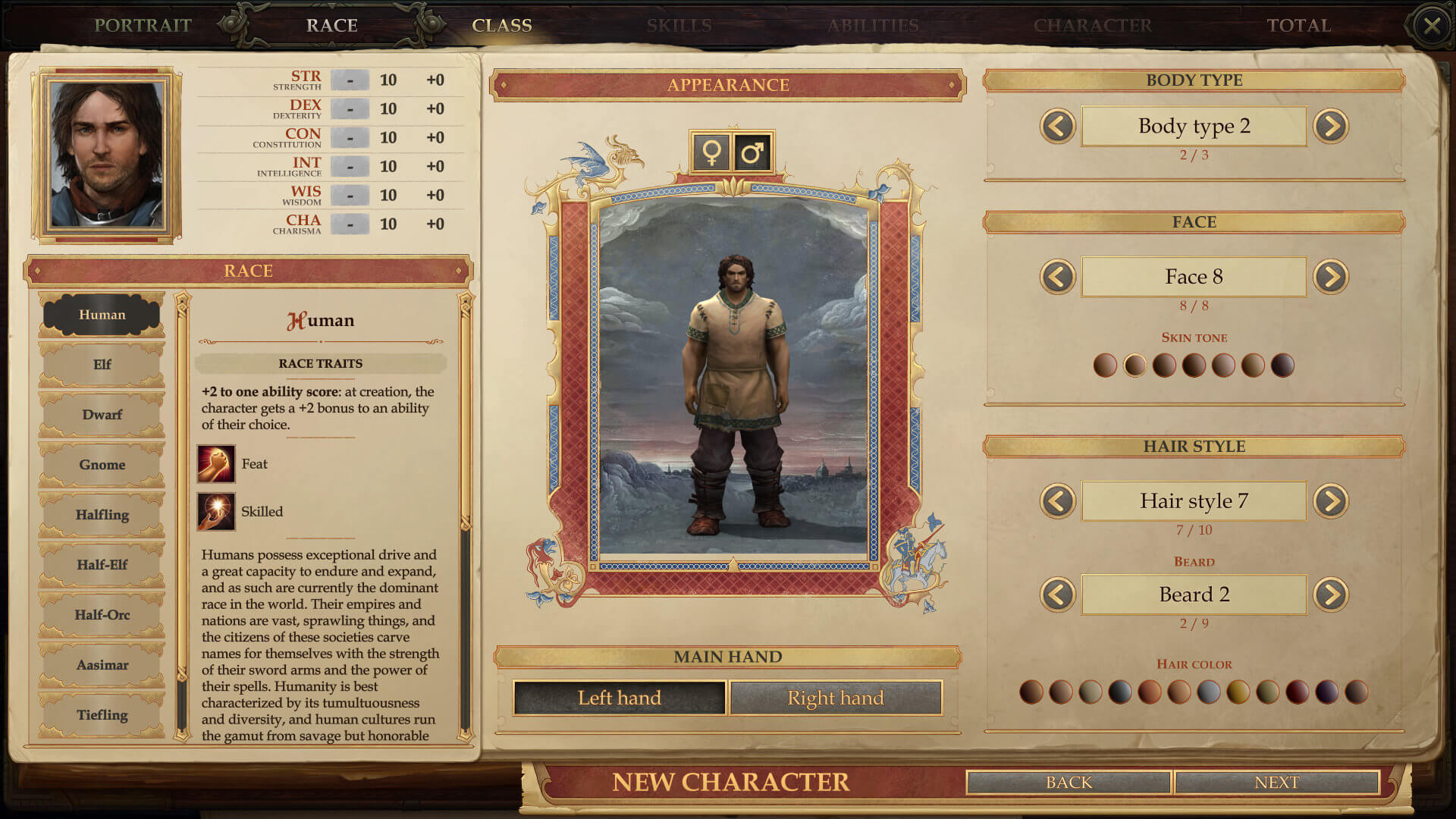
With a better understanding of attributes, we can move onto race. Players can select from a total of nine different races, each with their own bonuses, abilities, strengths, and weaknesses attached to them. The selection of race is more than cosmetic in this case; it can help you maximize your character's abilities early on in Kingmaker depending on your choice.
Here is the general rundown, along with the type of role that each race may be best suited for. For the most part, most races either give you one bonus ability modifier, or bonuses to two ability modifiers, with a penalty to a single ability modifier.
Human, Half-Elf, and Half-Orc: These three races have the ability to choose one ability score, giving you a +2 bonus in one stat without a -2 penalty. Allows a lot of flexibility but does offer limited options for ability scores.
Dwarf: Gains a +2 bonus to CON and WIS, and a -2 penalty to CHR. Dwarves make excellent melee classes and clerics.
Elf: Gains a +2 bonus to DEX and INT, and -2 penalty to CON. Elves are easily used for wizards, rangers and rogues.
Gnome: Gains a +2 bonus to CON and CHA, and -2 penalty to STR. Gnomes can be powerful bards and sorcerers.
Halfing: Gains a +2 bonus to DEX and CHA, and a -2 penalty to STR. Halfings make great rogues, bards and stealthy classes.
Aasimar and Tiefling: Unique among the other races, both Aasimar and Tieflings gain +2 bonuses and a -2 penalty based on their heritage, as they are half divine and half fiend, respectively. This runs the gamut of different possibilities.
I mentioned the best class roles for some of the characters above based solely on their ability bonuses. The bonuses make those races typically better suited for some classes, which in turn makes character creation easier. For new players, this can be invaluable information.
That said, players should always be free to build the character they want, whether it’s a Halfling barbarian or a Dwarven wizard. The character generation process in Kingmaker can make that possible, though creating those type of characters requires more advanced knowledge of the mechanics to make them powerful.
Choosing a Class: What’s my Role?
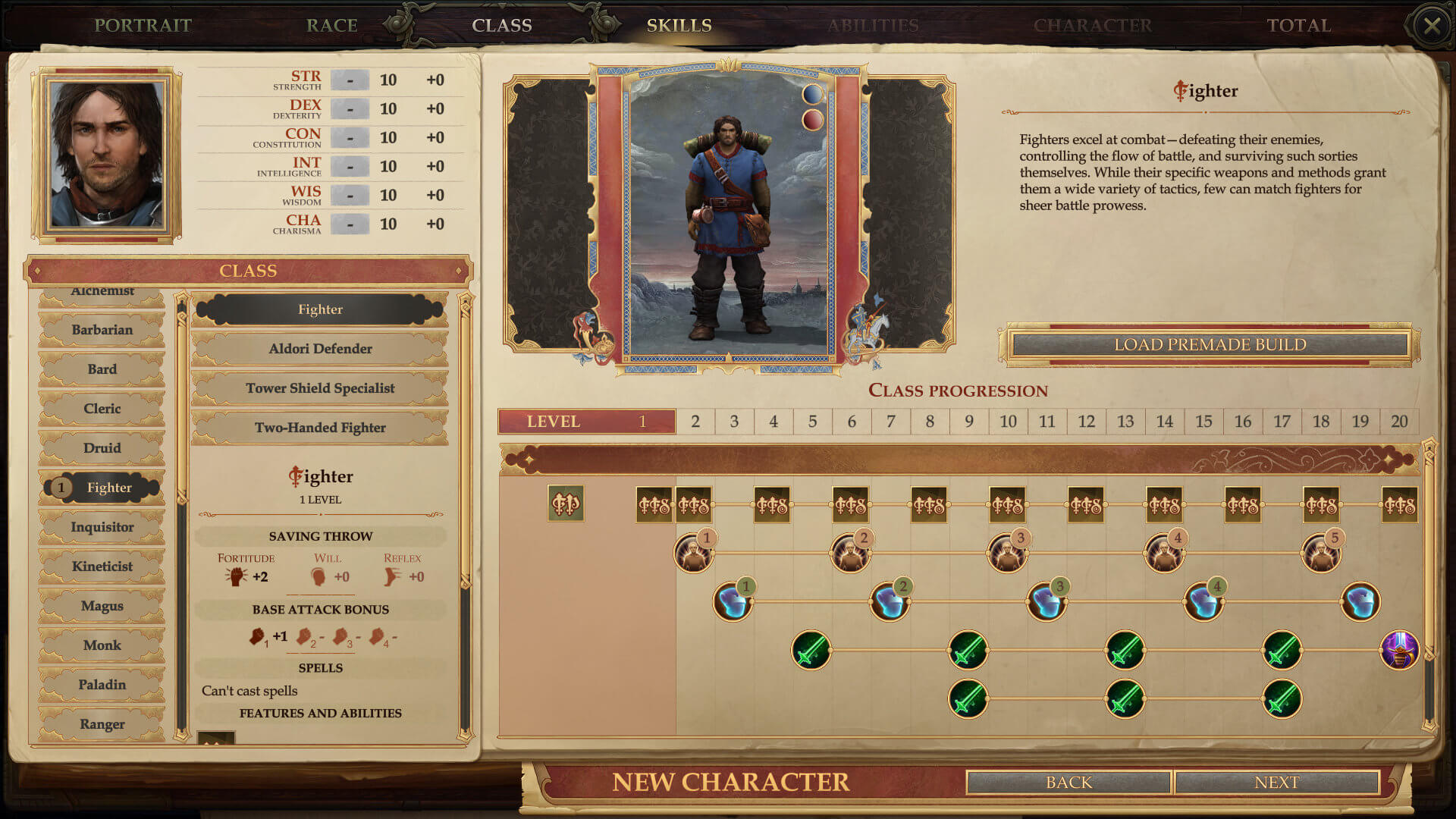
Perhaps the most complex part of character creation is your selection of class. Your class determines a lot of different mechanics in Kingmaker, from your recommended abilities, skill bonuses, and even the amount of class abilities, feats, and types of spells you can acquire.
There are a total of 16 different classes to choose from at the start of Kingmaker, with each base class having three additional ‘archetypes’ attached to them. These archetypes actually alter the bonuses and restrictions of each class, often changing the way you would play the class. On top of this, there are also seven prestige classes, special classes that have powerful bonuses that can only be unlocked if you meet certain prerequisites by doing something called multi-classing, where you choose to level up in a different class than your starting class.
If this sounds like a lot of information at once, don’t worry too much! In all honesty, a lot of the more advanced stuff like prestige classes and cross-classing is easy to master in Kingmaker once you get the hang of the basics.
For the sake of simplicity, i’m just going to give a brief description about the 16 base classes, their recommended abilities, and function in-game.
Alchemist: An Arcane class that uses bombs, poisons, and mutagens. Relies on INT.
Barbarian: A Martial class that uses rage powers to do more damage. Relies on STR and CON. Cannot be a Lawful Alignment.
Bard: A Support class that uses spells and songs to charm, heal, or buff characters. Relies on CHA.
Cleric: A Divine class that can heal, turn undead, and fight on the front lines. Relies on CON and WIS. Alignment must be within one of their chosen deity.
Druid: A Divine class that uses nature magic, animal companions, and other abilities. Relies on WIS. Must be a Neutral Alignment.
Fighter: A Martial class that fights on the front lines. Relies on STR and CON.
Inquisitor: A Divine class that can cast special judgements on enemies. Relies on WIS. Alignment must be within one of their chosen deity.
Kineticist: A Ranged class that harnesses elemental energy. Relies on DEX and CON.
Magus: An Arcane class that uses a mix of martial abilities and spells. Relies on DEX and INT.
Monk: A Martial class that uses unarmed attacks and special Ki powers. Relies on DEX, CON, and WIS.
Paladin: A Divine class that fights, heals, and turns undead. Relies on STR, CON, and CHA. Must be Lawful Good.
Ranger: A Ranged class that can fight from a distance and use divine spells. Relies on DEX and WIS.
Rogue: A Martial class that gets sneak attack and skill bonuses. Relies on DEX.
Slayer: A Martial class that combines the Rogue and Ranger skills. Relies on STR, DEX, and CON.
Sorcerer: An Arcane class that uses innate abilities to cast spells. Relies on CHA.
Wizard: An Arcane class that must prepare a wide variety of spells. Relies on INT.
In addition to the brief description above, each class also shares a few bonuses and saving throws that grow over time based on your class.
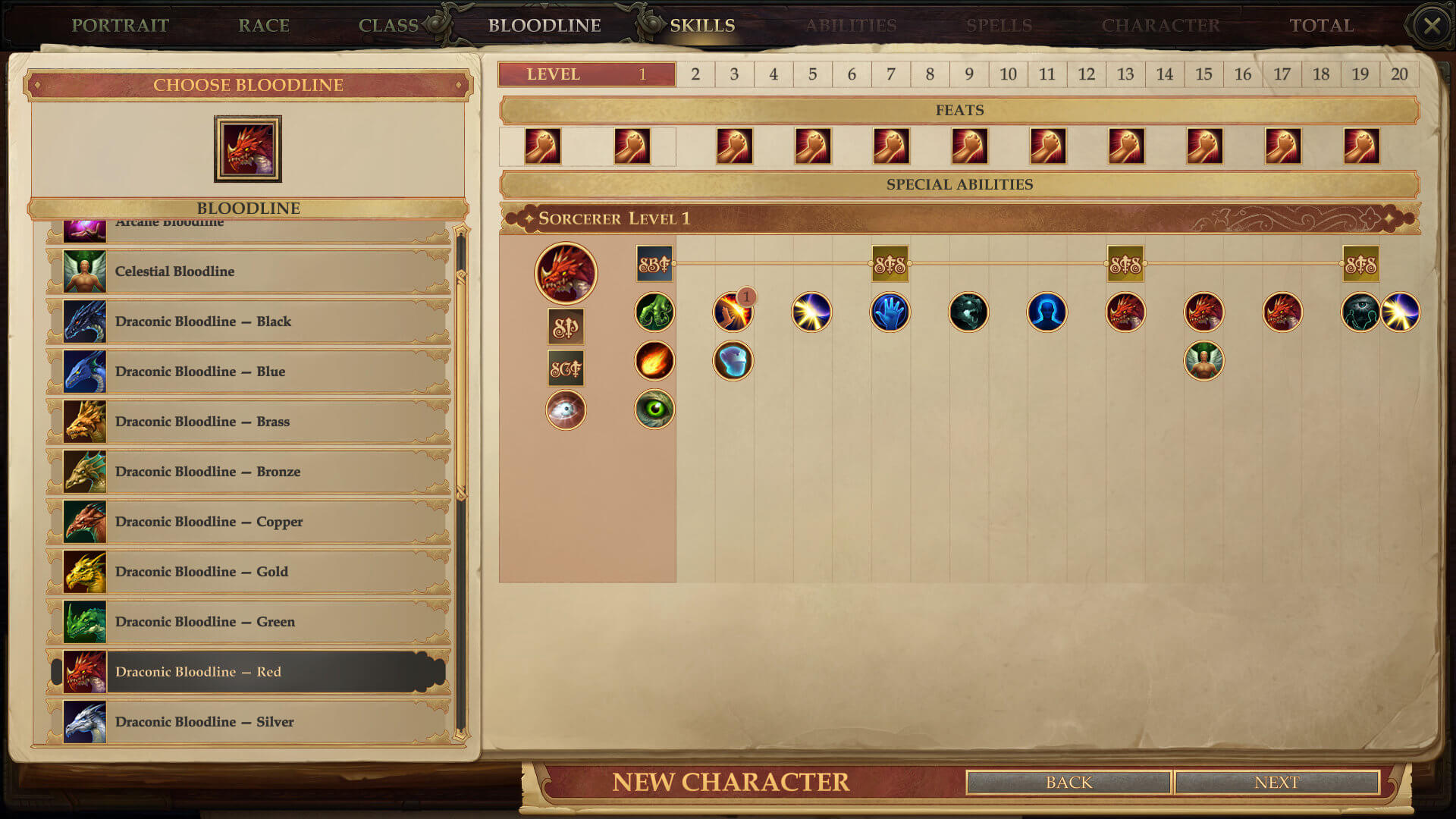
First is your hit dice, or HD, which simply determines the amount of hit points you get per level up, plus your CON modifier. HD ranges from d6 to d12, and are random rolls based on class when you level up. So if you create a fighter with a +3 CON modifier, whenever you level up, your HP will rise as a d10+3, so between 4-13 hit points.
Barbarians - d12
Fighter, Paladin, Ranger, Slayer - d10
Alchemist, Bard, Cleric, Druid, Inquisitor, Kineticist, Magus, Monk, Rogue - d8
Sorcerer, Wizard - d6
Next is your Base Attack Bonus, or BAB. BAB is an attack roll bonus that is dependent on your class. Martial classes tend to have higher BAB compared to spellcaster classes. If you have a full BAB, this typically means you get a +1 to attack rolls per level. Partial BAB, be it ¾ or ½, is rounded down, with ½ BAB being every two levels. Finally, once your BAB level hits a +6, you gain a second attack, starting at +1. This all stacks, which can see some martial classes reaching four attacks on a turn with varying bonuses.
The full breakdown is as follows:
1 BAB (Full BAB) per level - Barbarian, Fighter, Monk, Paladin, Ranger, Slayer.
¾ BAB (Partial BAB, rounded down) per level - Alchemist, Bard, Cleric, Druid, Inquisitor, Magus, Rogue, Kineticist.
½ BAB (Partial BAB, rounded down) per level - Sorcerer, Wizard.
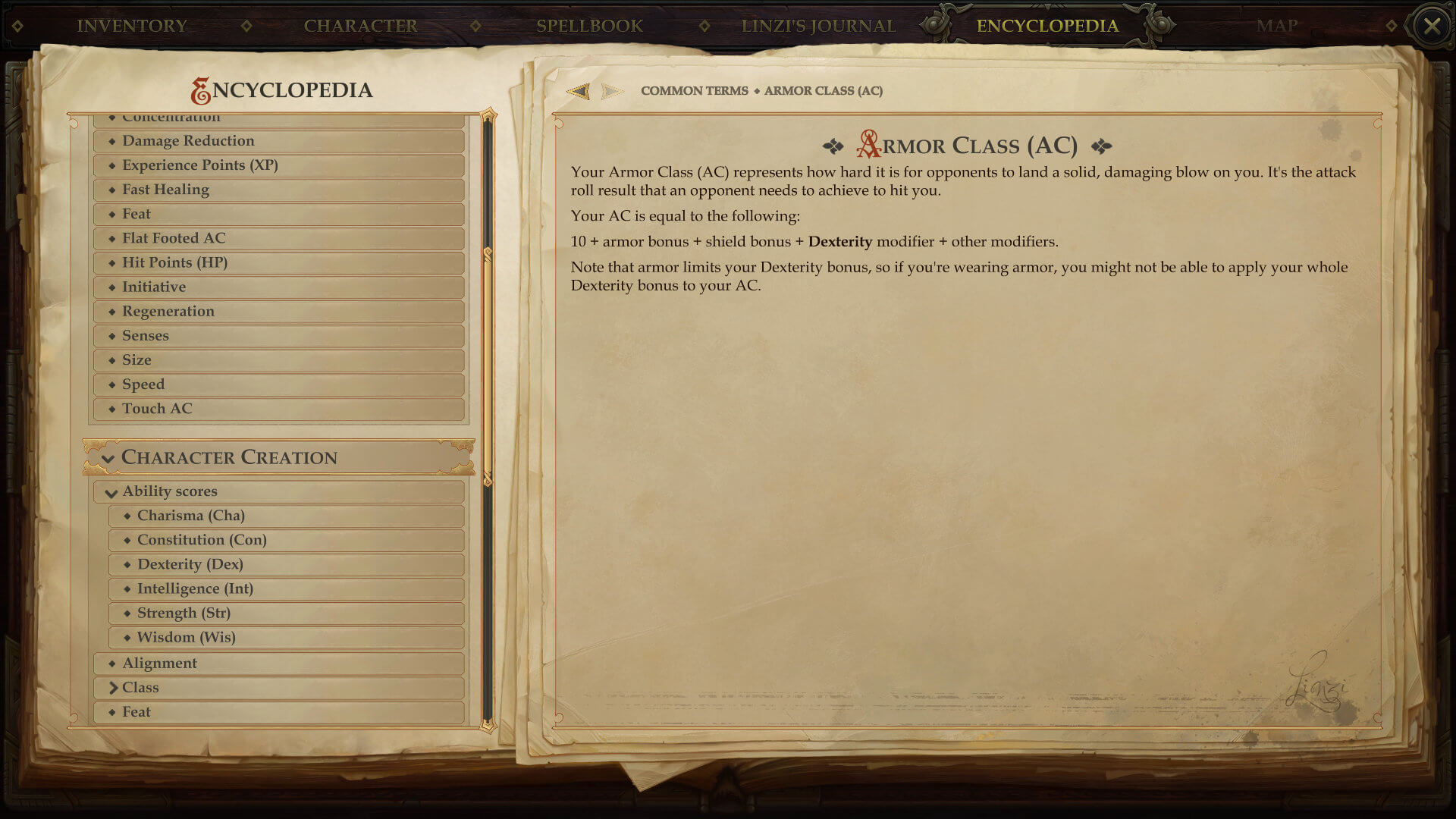
Finally, each class also gets three saving throws that go along with their armor class, or AC. Most attacks go after AC, but combat maneuvers, such as trip or disarm, magical spells such as Sleep, or poisons are resisted by these saves.
Fortitude: Resists diseases, poisons, and other body ailments.
Reflex: Resists and avoids traps and area-of-effect spells.
Will: Resists mental attacks and spells.
There are two types of progressions for saving throws: high and low. High progression starts a level 1 character with a +2 bonus to their save based on their class, and reach +12 by level 20. Low progression receives no bonus at the start, and will reach +6 by level 20. Your ability modifiers, as pointed out above, also affect the save modifiers, as do any chosen feats you acquire and equipment you wear. The list below is each class's progression.
Alchemist - Fortitude, Reflex = High. Will = Low.
Barbarian - Fortitude = High. Reflex, Will = Low.
Bard - Reflex, Will = High. Fortitude = Low.
Cleric - Fortitude, Will = High. Reflex = Low.
Druid - Fortitude, Will = High. Reflex = Low.
Fighter - Fortitude = High. Reflex, Will = Low.
Inquisitor - Fortitude, Will = High. Reflex = Low.
Kineticist - Fortitude, Reflex = High. Will = Low.
Magus - Fortitude, Will = High. Reflex = Low.
Monk - Fortitude, Reflex = High. Will = Low.
Paladin - Fortitude, Will = High. Reflex = Low.
Ranger - Fortitude, Reflex = High. Will = Low.
Rogue - Reflex = High. Fortitude, Will = Low.
Slayer - Fortitude, Reflex = High. Wil = Low.
Sorcerer - Will = High. Fortitude, Reflex = Low.
Wizard - Will = High. Fortitude, Reflex = Low.
Pathfinder: Kingmaker - Skills, Feats, and Spells
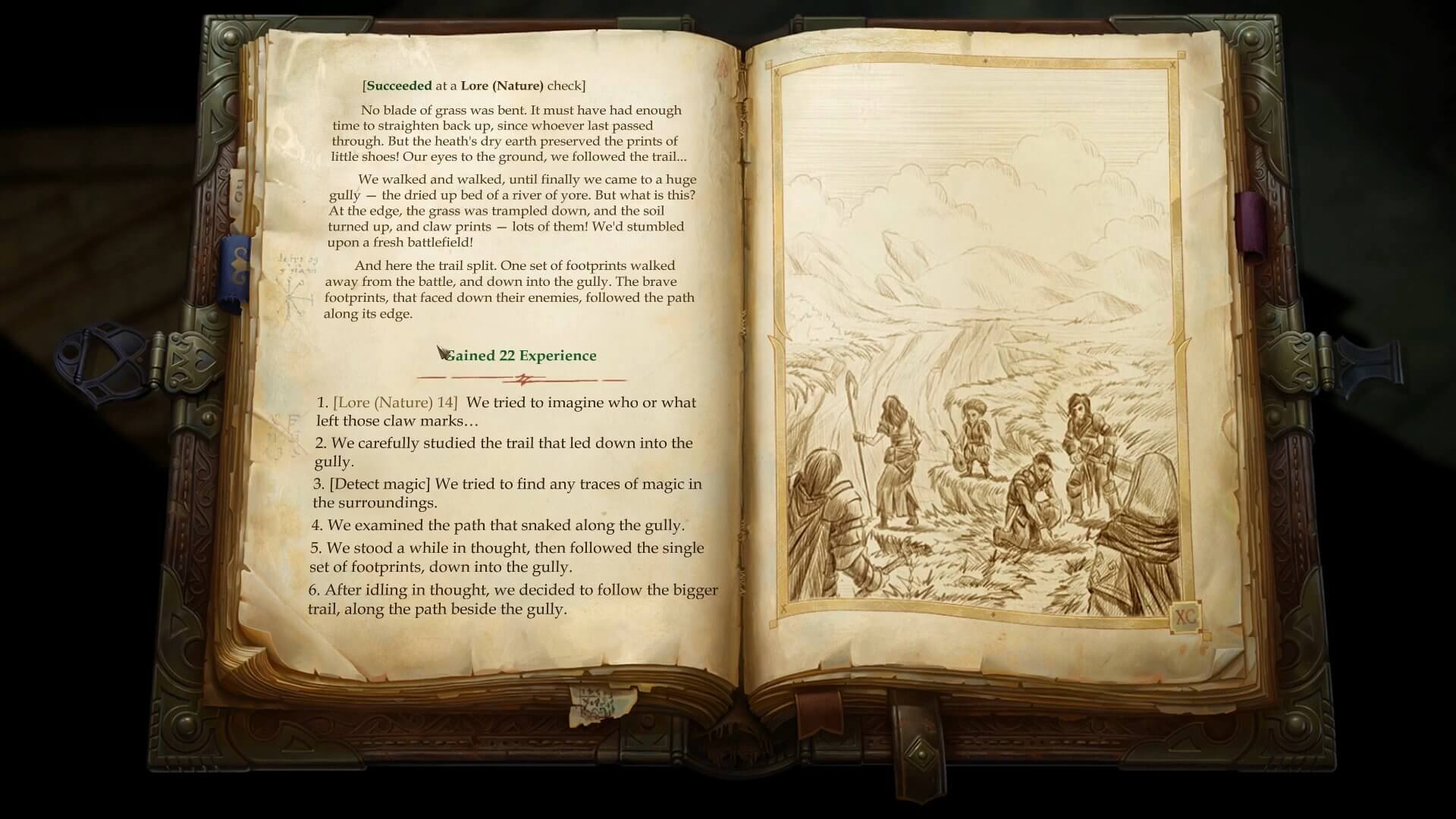
The final steps for character creation are determined based on class, but for the most part boil down to selecting character skills, feats, and spells.
Skills are additional bonuses that can be used through dialogue, used to maneuver through the world, or used to pass general ‘skill checks.’ Since everything is randomly rolled, the higher your skill modifiers are, the better. Each skill point increases the skill modifier by a +1. You gain skill points when you level up, based on your intelligence ability modifier, so a Wizard with +4 to their INT modifier would gain, at minimum, 4 skill points each time they level up.
Skill gain modifiers are based around your class and ability scores. Owlcat Games has marked which skills would receive that modifier in-game, often called class skills. Selecting to put a skill point in these modifiers adds an additional +3 points the first time you increase that skill. You can have positive and negative skill modifiers as well. Skills are also capped based on your current level, so if you have a level three character, your skills can only have 3 skill points in them total.
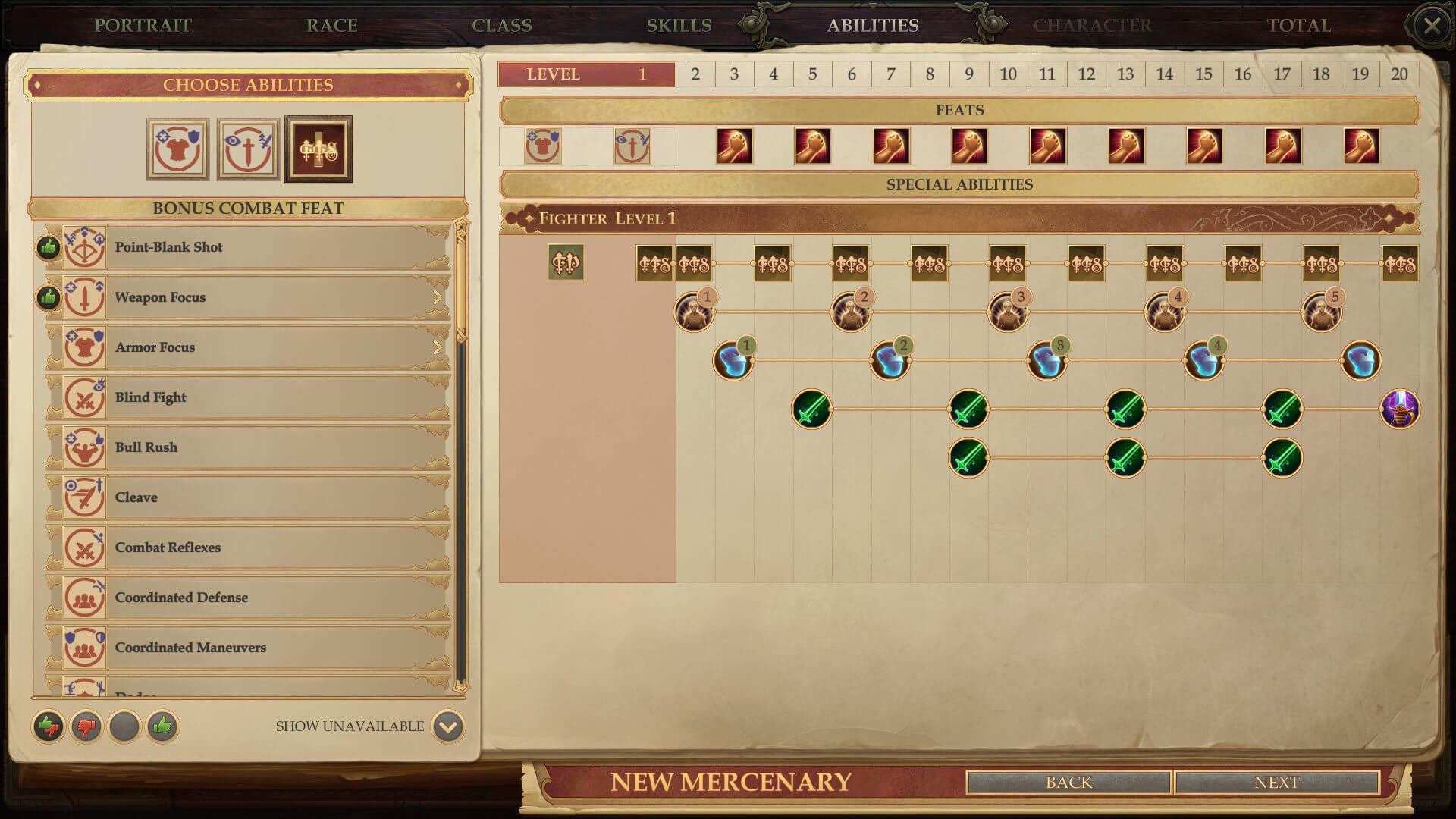
Feats are additional bonuses or changes to a character that can grant combat maneuvers, survivability, saving throws, or skills. They also can grant proficiencies with weapons and armor, allowing characters to use items that would normally be locked away from them by their class, such as a wizard using a greatsword.
Feats are broken down into five types:
General Feats: Offer standard bonuses or abilities, such as increasing saving throws or skills.
Combat Feats: Combat-related bonuses or abilities, such as weapon and armor proficiencies or maneuvers like power attack.
Combat Critical Feats: Combat-related bonuses that improve your critical hit chance.
Metamagic Feats: Spell manipulation abilities, such as extending the spell duration or reach.
Teamwork Feats: Abilities that only work if other characters carry the same feat.
Characters gain feats every odd level, starting with one feat at level one. Some classes, such as the Fighter for example, gain additional feats per even level as well, but they must meet certain prerequisites, such as a certain ability score, BAB, or even class ability. In total, there are around 150 different feats in the game, many of which require these prerequisites to access. So choosing the right combination of ability score, stats, and level is required to gain high-tier feats.
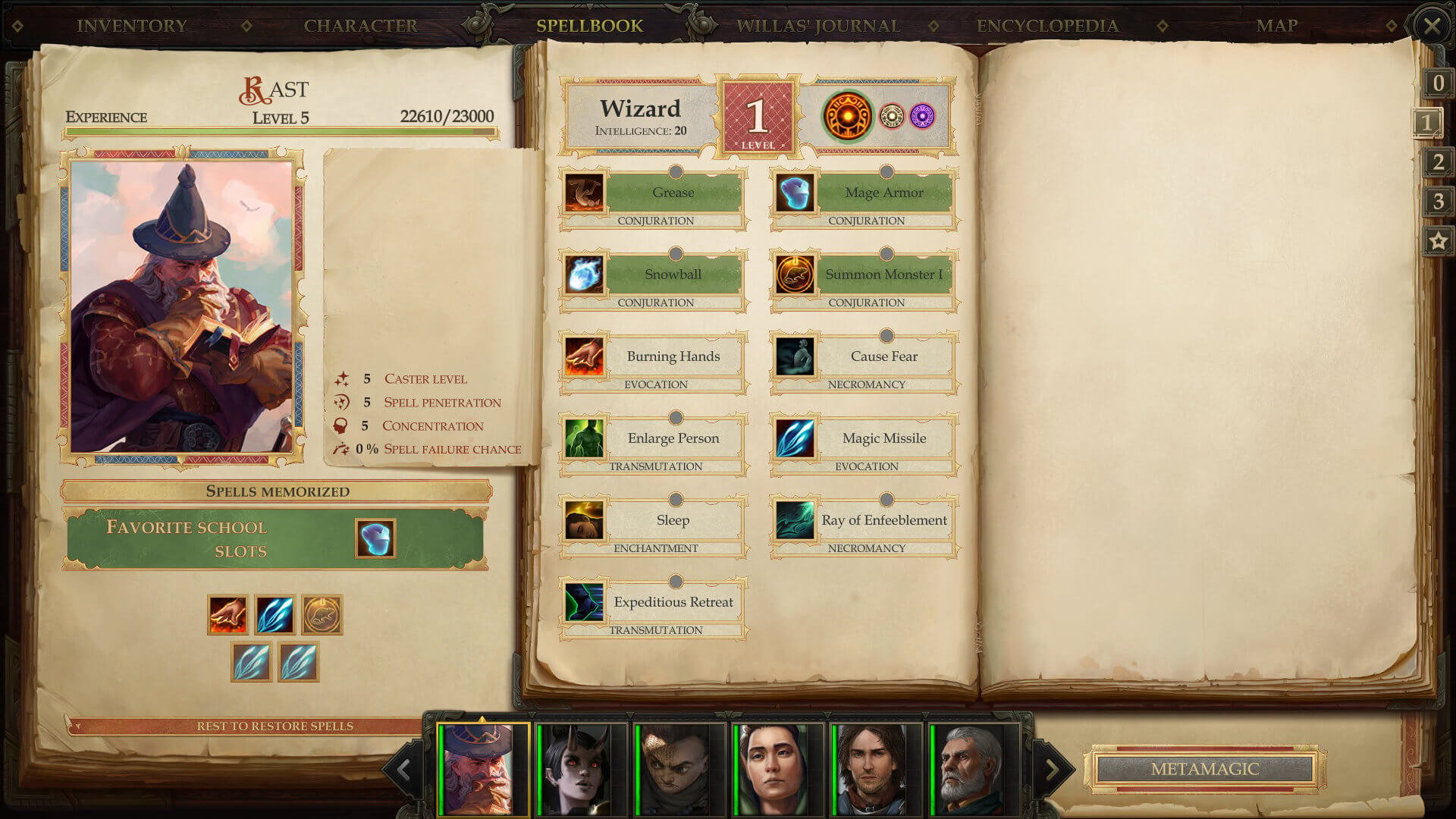
Newer players should focus on combat-style feats for almost every class. Some particular feats that tend to be useful early on include Weapon Focus, Armor Proficiency, Dodge, Point Blank Shot, Weapon Finesse, and Improved Initiative.
Finally, Spells are just as complex as feats, but are relegated to two basic categories: Arcane and Divine. Most Divine classes are given a ton of spells to select from, and can ‘prepare’ those spells for use. Arcane classes often must select their spells from a limited list, and have a certain amount of uses per day. To recover spells, players need to ‘rest’ their characters, meaning camping out or sleeping in a bed for a few hours. Some classes, such as Wizards and Cleric, can pick and choose which spells they want to cast as well, so if you are playing those classes, players should get in the habit of checking your spellbook before each rest.
The general rule of thumb here is to read the description of the spells, to get an idea of what the spell can do. Most arcane spells either attack, buff, or debuff, while most divine spells buff, debuff, or heal. There are exceptions of course, but for now, new players should just focus on the type of spells they want to cast. Some good level one recommendations would include Magic Missile, Burning Hands, Grease, and Mage Armor for Arcane classes, and Cure Light Wounds, Bless, True Strike, and Remove Fear from Divine Classes.
Final Touches and Final Thoughts
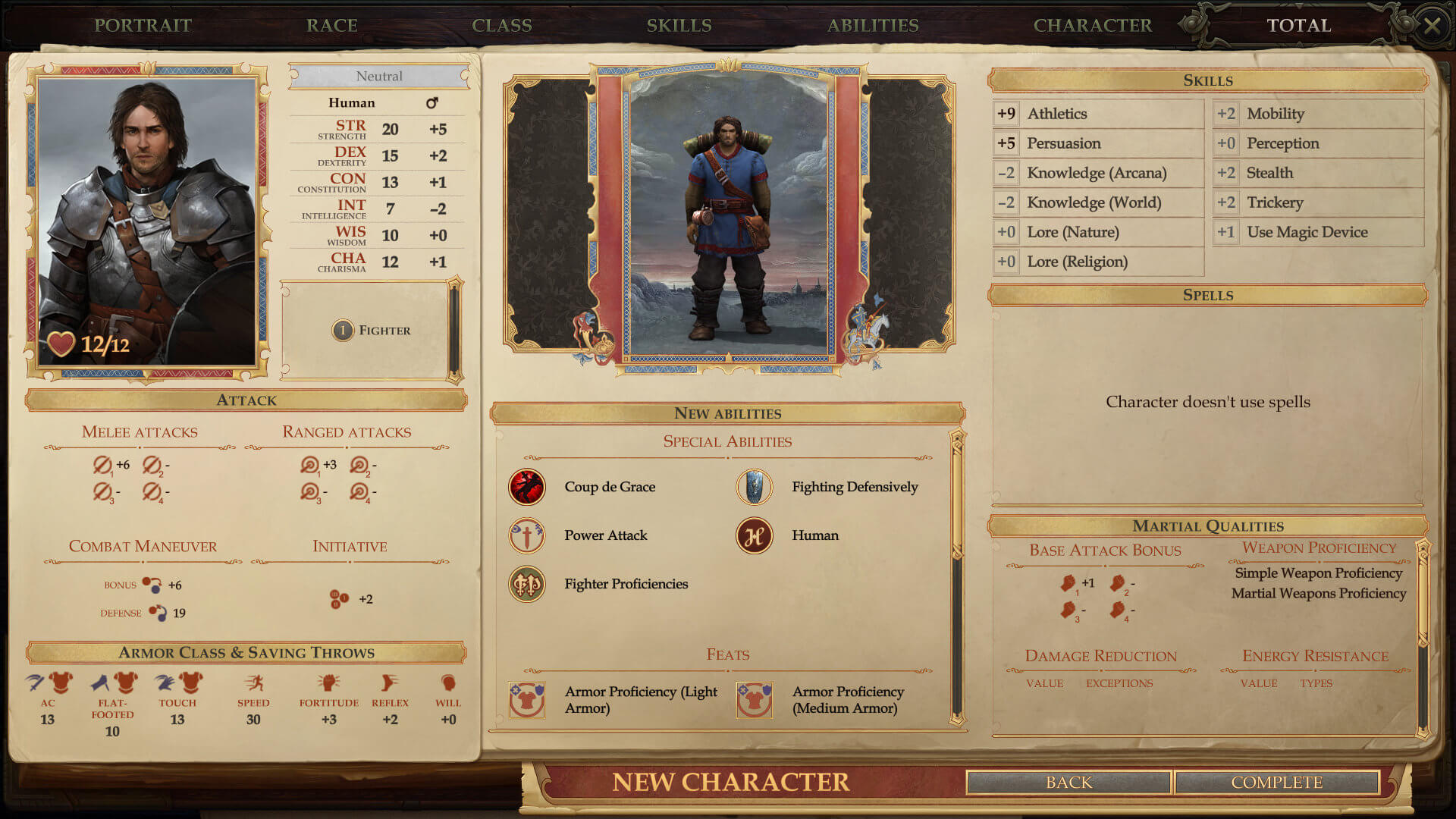
With that, this exhausting list of things to know about character creation is done! Again, the guide above is meant to be general information newer players should know when it comes to character creation, as a lot of the information above most players take for granted. The flexibility of the character creation process can allow for some pretty simple or advanced builds, but the tips above focused solely on maximizing your ability modifiers to make competent characters right out of the gate. Thankfully, OwlCat Games also included an encyclopedia in the menu screens, giving a basic rundown of all the games mechanics for players if they forget something.
If I were to recommend anything for new players, the best four classes to start with would be Cleric, Fighter, Ranger, and Sorcerer. Each offers some flexibility to experiment with your class builds, fits into a specific character archetype, and has simple enough mechanics that new players won’t be intimidated by more complex or specialty classes. As far as race recommendations, feats, ability modifiers, and more, that all depends on the player more than anything else. If there is one piece of advice I want to give to everyone, it is that players should create a character in the way they want. If nothing else, the above shows us the path to what is considered optimal builds for player characters.
As you can see, Pathfinder: Kingmaker is a pretty complex game when it comes to its mechanics, but once you get the hang of it, players will be able to generate characters that truly fit their own playstyle. For now, this is a good step forward for anyone looking to enjoy their quest to become the ruler of their own Kingdom.
Have a tip, or want to point out something we missed? Leave a Comment or e-mail us at tips@techraptor.net
